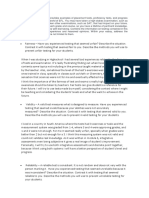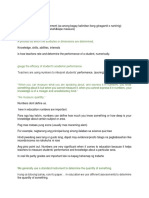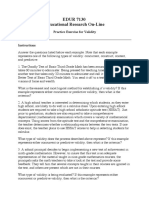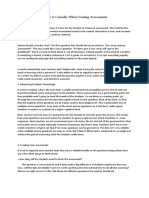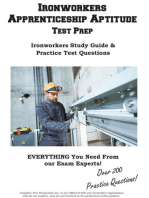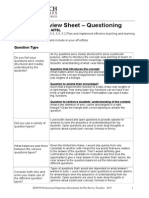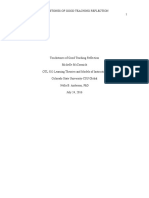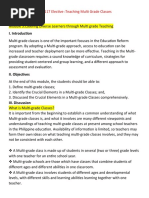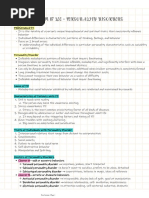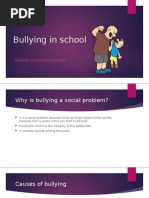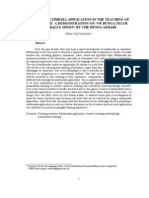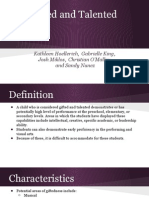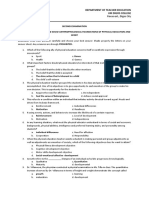0 ratings0% found this document useful (0 votes)
Ped106 Report
Ped106 Report
Uploaded by
Khatty SiasicoThis document discusses the criteria for constructing a valid and reliable test. It explains that the first steps in assessment are to review the learning objectives from the lesson plan and create a table of specifications. The most important criteria for a good test are validity and reliability. A valid test accurately measures what it intends to measure, while a reliable test produces consistent results across multiple test administrations. The document outlines different types of validity, including face validity, content validity, criterion validity, and construct validity. It emphasizes that a reliable test is not necessarily valid and both reliability and validity need to be measured.
Copyright:
© All Rights Reserved
Available Formats
Download as DOCX, PDF, TXT or read online from Scribd
Download as docx, pdf, or txt
Ped106 Report
Ped106 Report
Uploaded by
Khatty Siasico0 ratings0% found this document useful (0 votes)
This document discusses the criteria for constructing a valid and reliable test. It explains that the first steps in assessment are to review the learning objectives from the lesson plan and create a table of specifications. The most important criteria for a good test are validity and reliability. A valid test accurately measures what it intends to measure, while a reliable test produces consistent results across multiple test administrations. The document outlines different types of validity, including face validity, content validity, criterion validity, and construct validity. It emphasizes that a reliable test is not necessarily valid and both reliability and validity need to be measured.
Original Title
PED106_REPORT.docx
Copyright
© © All Rights Reserved
Available Formats
DOCX, PDF, TXT or read online from Scribd
Share this document
Did you find this document useful?
Is this content inappropriate?
This document discusses the criteria for constructing a valid and reliable test. It explains that the first steps in assessment are to review the learning objectives from the lesson plan and create a table of specifications. The most important criteria for a good test are validity and reliability. A valid test accurately measures what it intends to measure, while a reliable test produces consistent results across multiple test administrations. The document outlines different types of validity, including face validity, content validity, criterion validity, and construct validity. It emphasizes that a reliable test is not necessarily valid and both reliability and validity need to be measured.
Copyright:
© All Rights Reserved
Available Formats
Download as DOCX, PDF, TXT or read online from Scribd
Download as docx, pdf, or txt
0 ratings0% found this document useful (0 votes)
Ped106 Report
Ped106 Report
Uploaded by
Khatty SiasicoThis document discusses the criteria for constructing a valid and reliable test. It explains that the first steps in assessment are to review the learning objectives from the lesson plan and create a table of specifications. The most important criteria for a good test are validity and reliability. A valid test accurately measures what it intends to measure, while a reliable test produces consistent results across multiple test administrations. The document outlines different types of validity, including face validity, content validity, criterion validity, and construct validity. It emphasizes that a reliable test is not necessarily valid and both reliability and validity need to be measured.
Copyright:
© All Rights Reserved
Available Formats
Download as DOCX, PDF, TXT or read online from Scribd
Download as docx, pdf, or txt
You are on page 1/ 19
Introduction: Good morning Everyone,
Have A pleasant day to all. Today we are
going to discuss the characteristics of a
good test or the criteria for constructing a
good test. Now in doing an assessment this
is the third step but what are the first and
second steps?
#1 step: of course the first step there is
going back to your learning objectives.
What does it mean? The objectives that
you have used in the lesson plan and you
have using teaching are the same objective
that you will use in the assessment. Once
na nakuha Muna liwat Ang una nga
objectives when you are starting the lesson
or during the construction of your lesson
plan the next part is you have to construct
your table of specificationsl. Now,once you
have constructed your table of
specifications you have now the idea as to
what type of test you are going to
construct and in constructing those Test
items you have to follow the rules and you
have to follow the guidelines or criteria in
constructing a protest. There are lots of
criteria in constructing a good test no
matter what the test item Is, no matter
what the type is.Amuni sya nga
characteristics na dapat pagasundon or
Makita sa test nyo. Pero Ang pinaka
importanti sa tanan nga criteria except sa
clarity of learning objectives ,fairness,
practicality and efficiency .Ang pinaka
importanti ay Validity kag Reliability.Most
important criteria in measuring the
characteristics of a good test.Meaning test
items or the test itself has to be valid and
reliable . Now ,when we do say that the
test is valid and reliable?(I will repeat). So
okay, I’ll give you the definition,the valid
test means that it could measure what it is
supposed to measure.Buot silingon kaya
nya takson Ang dapat ya takson,ano bala
Ang dapat nya takson?amuna sya Ang
criteria.
A valid test is actually a test which could
really Measure if the improvements
needed to be given to the students based
on your objectives are really meet.Those
improvements nga pwd maacquire ,Ang
skills nga pwd ma acquire ka students mo
nga naka based sa structure or purpose sa
pagtudlo mo Kun na meet or na reach ba
nila .So amuna sya Ang ginatawag ta nga
Validity.
Ang reliability Naman Muni sya Ang test
nga may internal consistency so what does
it mean? Example kung mag pa test Ako or
ihatag ko ka 5 times or 10 times sa same
group of students Are they going to arrive
to almost the same sport given.it means if
one took the test 10 times Ang score nya
ay Wala galayo sa score nya sang sa
una.Bisan mag 87 or 85 pa da but still Wala
galayo sa score nya.And that’s what we
call internal consistency.Now let’s explain
it further ,e clarify pa natun. Another
example is CHISMIS pag may mabatian ta
nga chismis ,mostly ta mabatian sa mga
tawo ,namangkot gd na sila Kun Reliable
bala Ang source mo.Valid bala Ang
impormasyon nga Gina deliver mo.so ano
bala buot silingon Sina? Parehas sini Ay
Nakita ko si Maria gabusong c
Maria .Reliable bala Ang source mo.it
means sa 10 or 20 ka tawo nga imu
ginsugiran sang chimis nga Muna ga
busong si Maria pare parehas lang Ang
impormasyon nga na deliver nila
(consistent Ang chismis nga halin sa
source)sa 10 ka tawo Isa lang ka statement
Ang ila nachismis which means reliable
Ang source. So ano natawag ta na Valid?
amuni sya Ang tuod or factual sya. Kung
consistent bala Ang impormasyon natun
kag sulit² na Gina hambal Ang statement
nga to.bisan 10 pa ka tawo or 20 or bisan
pila pa da ka tawo atun na istorya ,so it
means valid bala sya or tuod? Ang sabat
Dira is HINDI,
So it means that hnd tanan nga chance
(pagkakataon)that we are consistency
what we say we are telling the truth ,we
are factual. So it means that a reliable test
is not automatically a valid test.So it
means even if the scores of the students
are consistent with the number of times he
will take the test or he will took the test it
doesn’t mean that is valid, it may be
reliable but it is not valid. Pero remember
when something is true you will be
consistent. Buot silingon if you are starting
facts ,if you are stating the truth it will be
consistent.Truths are consistent.it means a
valid test is a reliable test but A reliable
test is not automatically a valid test .
So when you are going to measure the
reliability of the test and the reliability is
good it doesn’t mean you will not measure
the validity .You still have measure the
validity of the test.Once you measure the
validity you may not compute more
reliability.
So now, we are going to discuss the
different types of validity and the methods
of computing the reliability of a test.
Let’s go first the different types of validity,
we have four types ,we have Face
Validity,Content, criterion,and the other
one is construct.
When do we say that a test has face
validity?Face refers to a physical
appearance of the test.How does the test
looks like ,of course it will referring to a
test paper with all the items in there with
all the test paper itself ,it will be examined
and it has to pass face validity . So San o ta
bala mahambal nga Ang Isa ka test ay may
face validity?.1.) if it is readable 2.)it is free
from the grammatical error ,it could really
be fully understood by your student in
terms of instruction .What else? CLEAR
ANG PHOTOCOPY OR PRINTING Ng
test.Kung gn hand written man ni teacher
Ang test paper items ,main chindihan nyo
Ang Agi ka maestra ,the spacing is correct
hnd man sya Tama ka laba or lip ot, Ang
tsakto lang nga spacing kag font size. Ang
font color should be readable,hnd kulay
red or yellow .Dapat clear nga mabasa
maayo kaa students nga hnd man magsakit
Ang mata. But the most important part of
face validity is the arrangement of the
item. The item it has to be arranged from
easy to difficult.Maybe aside sa physical
appearance sang test. Your teacher may
ask you about the other face validity that
you might think of . Which are very
important when you are construct test
items. Okay again, that’s the Face Validity,
That’s the physical appearance of test
The next one is Content Validity, Since this
is Content it could be referring daw to
what is inside the test paper.Not just sa
physical kundi sa Content . Ano Ang
Content nga to? So ano Ang dapat una² e
consider ta sa content validity . First – are
the test congruent or relevant to all of the
test objectives. Amu to sya Ang test nga gn
ubra nga naka base sa objectives sang
lesson plan or sa learning objectives sa
TOS. Amu ni sya Kun kis a Ang
problema.Automatically kung Wala gn
kuha ni teacher ya objectives nga Ara sa
lesson plan kag nag ubra sya sang bag o
nga objectives didtu sa TOS . Automatically
valueted si validity,Anong klaseng validity.
Kag amuna may problems sa Content
Validity , automatically hnd maipasar sang
mga students Ang test. So what else?
There would be cases that Teachers will be
using the objectives the lesson plan but
when he taught the lesson he did not use
the objectives in teaching the lessons. So
Bali amuni sya ,Ari Ang lesson plan nga sa
papel tapos si teacher lain Ang
gintudlo ,lain Ang gn topic.Pero syempre
mag ubra ka TOS automatically it has to
follow your LP .Ginfollow ya man ,so
meaning nagka gap didtu sa teaching ,
automatically Wala content.there is no
content validity. Kay the idea there is the
way you taught your student has to be
based on the objectives of the LP and the
way you taught the student is the way you
train them.So the way you train them has
to be the way you testing them
also.Meaning you do assessment based on
your training,Kay amu na sya Ang trading
mo sa ila. So Kun analysis Ang training mo
sa ila,then magpa test ka sa ila sang
analysis Man. Pero when you taught them
and your only manner of teaching is just to
explain or define everything of all the
lesson then do not expect them to be
trained in analytical thinking because they
will not able to analyze .So there will again
Be problems with content validity.Okay, it
has to be congruent,the lesson objectives
They way you will taught the way you will
ask questions.Pero may mga times kis a
nga Lain Ang Lesson nga ginatudlo lain
Ang ginpatest.Not unless gn construct
Naman ni Teacher, na bala abi ka mga
students Wala gntudlo but the truth is
gnreconstruct lang ni teacher.They didn’t
encourage memorization so there has
been reconstruction of the words.but the
topic is not really not taught, not really
taught totally.
That’s why ga ubra kita TOS para safe sa
Content Validity.Basta ginsunod mo Ang
TOS mo, may content validity Ang imu nga
test.Automatic na Kay gnsunod mo Ang
TOS .Ginsunod mo sya at the same time
amo to Ang gingamit mo sa pag
teach,Okay.
The next one is Criterion Validity, when
we say criterion Validity it is referring to
the idea that your criteria .it is referred to
the test could really Measure an external
aspect.Buot silingon sang external aspect
Kung naggamit ka sang iban nga test kag
Ang test na external nga to gin compare sa
test nga gin ubra mo .When you compare
these two test, they correlate To each
other.And there is Criterion
Validity.Liwaton ko ah, Criterion Validity
there is a test ,and these test could
measure a given criteria Or could measure
a given ummm characteristics or another
test it is compared to that then there will
be criterion Validity. So there is 2 types
Predictive Validity and the other one is
concurrent.So ano ini sila?so hmbal natun
kung Ang Criterion Validity,we compare it
into something. So mahambal ta Ang
validity ay Predictive it means A test is
constructed now Currently there is a test
which is constructed and it correlates the
criteria of the test , correlates to the
performance of the student.It could
predict the future performance of the
student. Example We have constructed
certain ability test and this ability test we
have tried to correlate it to the passing of
the Education students sa Licensure
examination so nag ubra kita sang test sa
tanan nga areas Sa GenEd,ProfEd or Major
sheet ,Nag ubra kita sang test tapos na
predict nya ni nga Amu ni sya Ang mga
Bata nga makapasar .Kay sila to Ang
nakapasar sa amuna nga test,sila man to
makapasar sa Licensure examination after
4yrs. We computed that reliability or
correlation .And we were able to that they
are correlated .So meaning Ang test nga ni
ay may ginatawag nga Predictive Validity,
Kay Gina predict nya Ang future
performance sang mga Bata. While
Concurrent Validity Naman ya is the type
of validity whereby a test is constructed 10
years ago,5 years ago but when this test
which was constructed long time ago and
was used today , Currently used It can still
predict the same factor or ability which it
had predicted before . Example Mam
Donna was constructed a test 10 years
ago ,then one of the faculty members
found the test items and we tried to give
the test to the students and it was found
out that it correlated the grades of your
students. So meaning the old test 10 years
ago,it was constructed but it can still be
used now
It can still measure the same ability that
we measured Before of the same
degree ,then the test has concurrent
Validity.
So the last type of Validity is Construct
Validity, when it comes sa construct We
two types.Divergent and Convergent
Construct. When we say construct it means
factor.Since this is factor meaning it entail
relationship .If the test is related to
another test or the test is intended to be
given for a specific ability test could still be
correlated as measure another ability
test .Amu sya Ang ginatawag ta na
construct Validity.
When we say divergent construct ,meaning
there is internal relationship among all of
the test items Kay may internal
relationship sila kaya nila e measure Ang
Isa ka ability.
I believe our teachers have told that Group
of interralated competencies are
ability,group of interralated skills are
competencies.So, Ang idea natun nagung
factors sya sa amuni nga grupo that related
competencies and it measures one skills.So
amuna sya Ang construct.
When we say Divergent construct If you’ve
watched The Movie Divergent,it is to be
divergent because naiiba sya sa tanan. So
it means kung Ang test ay may divergent
construct,nalain sya sa tanan,it means isa
lang Ang ability Ang Makaya e measure.
Example : a test is constructed and it’s
intended to construct. I think it is intended
to measure LOGICAL-
MATHEMATICAL(sulat sa whiteboard)
ABILITY . This test is said to be divergent or
convergent? Okay, this test would be
convergent because it would measure logic
and mathematics,but if this test can only
measure logical ability and it cannot
measure mathematical ability then this is
divergent test, divergent construct.Ngaa
nagdivergent sya? Kay Ang factor nya ay
Isa lang kaya e measure logical kag ngaa
natawag man sya convergent? Because
ginaconvertt sya it means pare pareho lang
sila.Tungod pareho lang sila LA and MA it
considered as convergent . Inshort kung
more than 1 Ang ability nga na measure it
is called convergent.kung Isa lang it is
called Divergent.
You might also like
- Sack Sentence Completion Scoring and Interpretation100% (4)Sack Sentence Completion Scoring and Interpretation3 pages
- VALIDITY A Good Test Must First of All Be VALID Script ReportNo ratings yetVALIDITY A Good Test Must First of All Be VALID Script Report2 pages
- Differences Between Testing, Assessment and EvaluationNo ratings yetDifferences Between Testing, Assessment and Evaluation25 pages
- Placement Mentor Teacher: Questions and Answers On Assessment How Do You Feel About Assessment?No ratings yetPlacement Mentor Teacher: Questions and Answers On Assessment How Do You Feel About Assessment?4 pages
- Alternative Names For Authentic AssessmentNo ratings yetAlternative Names For Authentic Assessment4 pages
- 0308 - How To Study For Technical Courses - Making The Most of Problem Sets-EnNo ratings yet0308 - How To Study For Technical Courses - Making The Most of Problem Sets-En4 pages
- General Principles of Testing: 1. Measure All Instructional ObjectivesNo ratings yetGeneral Principles of Testing: 1. Measure All Instructional Objectives4 pages
- Q&A - 7PS028 - Personality, Ability & Individual Differences - TranscriptNo ratings yetQ&A - 7PS028 - Personality, Ability & Individual Differences - Transcript21 pages
- Assessment of Early and Literacy Skills - MTB Mle NotesNo ratings yetAssessment of Early and Literacy Skills - MTB Mle Notes6 pages
- Factors in Constructing Evaluative Instruments0% (1)Factors in Constructing Evaluative Instruments3 pages
- Articles: Quality in Assessment: What Makes A Good Test?No ratings yetArticles: Quality in Assessment: What Makes A Good Test?5 pages
- Things To Consider When Creating AssessmentsNo ratings yetThings To Consider When Creating Assessments3 pages
- Ironworkers Apprenticeship Aptitude Study GuideFrom EverandIronworkers Apprenticeship Aptitude Study GuideNo ratings yet
- Why Validity Implies Reliability But Not The Reverse?: AnswersNo ratings yetWhy Validity Implies Reliability But Not The Reverse?: Answers8 pages
- How To Succeed in Honors Physics by Really Trying 2012100% (1)How To Succeed in Honors Physics by Really Trying 20123 pages
- Technology Management Introduction SeminarNo ratings yetTechnology Management Introduction Seminar38 pages
- Differences Between Chorni Assessment and Evaluation for ConferenceNo ratings yetDifferences Between Chorni Assessment and Evaluation for Conference35 pages
- Characteristics of A Good Test: A Reflection PaperNo ratings yetCharacteristics of A Good Test: A Reflection Paper8 pages
- Module 8 Critical Thinking Reflection Otl 502No ratings yetModule 8 Critical Thinking Reflection Otl 5027 pages
- Miller Analogies Skill Practice!: Practice Test Questions for the Miller Analogies TestFrom EverandMiller Analogies Skill Practice!: Practice Test Questions for the Miller Analogies TestNo ratings yet
- People Centered Development Management and EmpowermentNo ratings yetPeople Centered Development Management and Empowerment35 pages
- Microsoft Corporation's Organizational Culture & Its CharacteristicsNo ratings yetMicrosoft Corporation's Organizational Culture & Its Characteristics2 pages
- "Just Talk To Me": Day 5: Vulnerability & Meta-Communication Relational HomeworkNo ratings yet"Just Talk To Me": Day 5: Vulnerability & Meta-Communication Relational Homework4 pages
- Teaching Resource Mental Status ExaminationNo ratings yetTeaching Resource Mental Status Examination3 pages
- Semi-Final Examination Ge 1: Understanding The Self: Pangasinan State University100% (1)Semi-Final Examination Ge 1: Understanding The Self: Pangasinan State University4 pages
- Psychometrics of The PTSD and Depression Screener For Bereaved YouthNo ratings yetPsychometrics of The PTSD and Depression Screener For Bereaved Youth13 pages
- English 10 Q4 SLM WEEK 2 Technical and Operational DefinitionsNo ratings yetEnglish 10 Q4 SLM WEEK 2 Technical and Operational Definitions15 pages
- Bullying in School: Problem, Causes and SolutionsNo ratings yetBullying in School: Problem, Causes and Solutions9 pages
- Using A Multimedia Application in The Teaching of Literature100% (1)Using A Multimedia Application in The Teaching of Literature9 pages
- Conflict Management.: by Kitanda JonathanNo ratings yetConflict Management.: by Kitanda Jonathan110 pages
- Bolbatun - Margarita - - - 171 тексты и песниNo ratings yetBolbatun - Margarita - - - 171 тексты и песни10 pages
- Department of Teacher Education Um Digos College: Roxas Ext., Digos CityNo ratings yetDepartment of Teacher Education Um Digos College: Roxas Ext., Digos City5 pages
- Sack Sentence Completion Scoring and InterpretationSack Sentence Completion Scoring and Interpretation
- VALIDITY A Good Test Must First of All Be VALID Script ReportVALIDITY A Good Test Must First of All Be VALID Script Report
- Differences Between Testing, Assessment and EvaluationDifferences Between Testing, Assessment and Evaluation
- Placement Mentor Teacher: Questions and Answers On Assessment How Do You Feel About Assessment?Placement Mentor Teacher: Questions and Answers On Assessment How Do You Feel About Assessment?
- 0308 - How To Study For Technical Courses - Making The Most of Problem Sets-En0308 - How To Study For Technical Courses - Making The Most of Problem Sets-En
- General Principles of Testing: 1. Measure All Instructional ObjectivesGeneral Principles of Testing: 1. Measure All Instructional Objectives
- Q&A - 7PS028 - Personality, Ability & Individual Differences - TranscriptQ&A - 7PS028 - Personality, Ability & Individual Differences - Transcript
- Assessment of Early and Literacy Skills - MTB Mle NotesAssessment of Early and Literacy Skills - MTB Mle Notes
- Articles: Quality in Assessment: What Makes A Good Test?Articles: Quality in Assessment: What Makes A Good Test?
- Ironworkers Apprenticeship Aptitude Study GuideFrom EverandIronworkers Apprenticeship Aptitude Study Guide
- Why Validity Implies Reliability But Not The Reverse?: AnswersWhy Validity Implies Reliability But Not The Reverse?: Answers
- How To Succeed in Honors Physics by Really Trying 2012How To Succeed in Honors Physics by Really Trying 2012
- Differences Between Chorni Assessment and Evaluation for ConferenceDifferences Between Chorni Assessment and Evaluation for Conference
- Characteristics of A Good Test: A Reflection PaperCharacteristics of A Good Test: A Reflection Paper
- The Seven C's of Positive Behaviour Management: Alphabet Sevens, #1From EverandThe Seven C's of Positive Behaviour Management: Alphabet Sevens, #1
- Miller Analogies Skill Practice!: Practice Test Questions for the Miller Analogies TestFrom EverandMiller Analogies Skill Practice!: Practice Test Questions for the Miller Analogies Test
- People Centered Development Management and EmpowermentPeople Centered Development Management and Empowerment
- Microsoft Corporation's Organizational Culture & Its CharacteristicsMicrosoft Corporation's Organizational Culture & Its Characteristics
- "Just Talk To Me": Day 5: Vulnerability & Meta-Communication Relational Homework"Just Talk To Me": Day 5: Vulnerability & Meta-Communication Relational Homework
- Semi-Final Examination Ge 1: Understanding The Self: Pangasinan State UniversitySemi-Final Examination Ge 1: Understanding The Self: Pangasinan State University
- Psychometrics of The PTSD and Depression Screener For Bereaved YouthPsychometrics of The PTSD and Depression Screener For Bereaved Youth
- English 10 Q4 SLM WEEK 2 Technical and Operational DefinitionsEnglish 10 Q4 SLM WEEK 2 Technical and Operational Definitions
- Using A Multimedia Application in The Teaching of LiteratureUsing A Multimedia Application in The Teaching of Literature
- Department of Teacher Education Um Digos College: Roxas Ext., Digos CityDepartment of Teacher Education Um Digos College: Roxas Ext., Digos City
